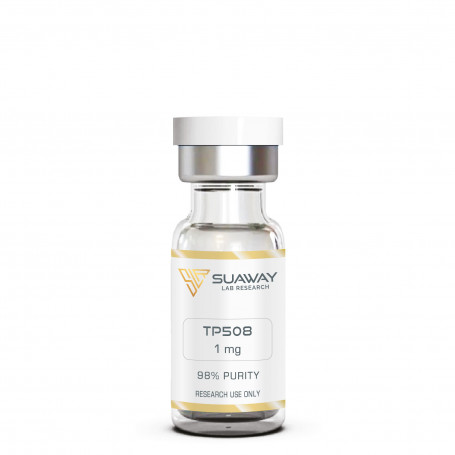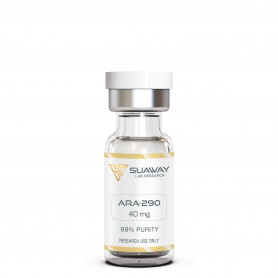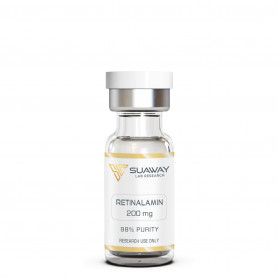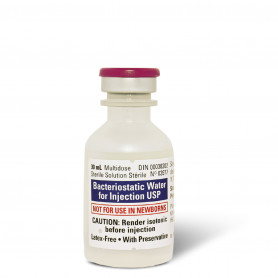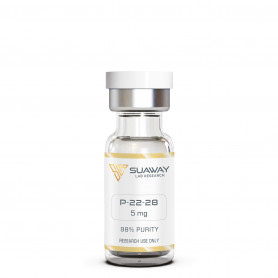Description
STRUCTURE
Sequence: H-Ala-Gly-Tyr-Lys-Pro-Asp-Glu-Gly-Lys-Arg-Gly-Asp-Ala-Cys-Glu-Gly-Asp-Ser-Gly-Gly-Pro-Phe-Val-NH2
Molecular Weight: 2311.4 g/mol
PubChem CID: 16158206
Peptide purity: greater than 98%
Other details: No TFA Salt, No Mannitol
Storage: Lyophilized peptide must be stored at -20°C and peptide solution at 4°C.
TP508 has low oral and excellent subcutaneous bioavailability.
DESCRIPTION
TP508 is an investigational peptide drug that was developed for use in stimulating repair of dermal and musculoskeletal tissues.
TP508 is a 23-amino acid peptide representing amino acids 508–530 of human prothrombin that was identified as the high-affinity binding domain of thrombin responsible for interaction with a subset of thrombin receptors on the surface of fibroblasts thought to initiate tissue repair.
TP508 was shown to initiate tissue repair and regeneration by reversing endothelial dysfunction, stimulating revascularization, attenuating inflammation, and reducing apoptosis.
In human clinical trials, TP508 was shown to significantly increase healing of diabetic foot ulcers and distal radius fractures with no drug-related adverse events. Animal studies also showed that TP508 treatment regenerated bone in critical-size defects where new bone formation would not occur without intervention.
Recently, this 23-amino acid regenerative peptide has been shown to target stem/progenitor cells isolated from tissues and stimulate their proliferation. Thus, many of the tissue repair and regeneration effects of TP508 may be mediated by the activation of progenitor/stem cells within tissues.
As mentioned before, TP508 is an angiogenic tissue repair peptide and it was tested for potential effects on myocardial revascularization and ED using a porcine model of chronic myocardial ischemia.
TP508 increased perfusion in ischemic regions up to16-fold and doubled myocardial wall thickening relative to placebo controls.
Ischemic arterioles exhibited impaired NO-mediated vasodilation and diminished NO production. TP508 reversed ischemic effects, increasing NO-mediated vasodilation, endothelial nitric oxide synthase (eNOS) expression, and NO production.
Endothelial dysfunction (ED) is characterized by impaired nitric oxide (NO) signaling, decreased NO-dependent vasodilatation, increased vascular inflammation, and diminished response to angiogenic factors.
In human endothelial cells, TP508 stimulated eNOS activation, increased NO production, and prevented hypoxia-induced eNOS downregulation. Thus, TP508 reverses ED both in porcine ischemic hearts and cultured human endothelial cells. These results suggest potential therapeutic benefit of TP508 in myocardial revascularization and treatment of ED-related diseases.
Given that TP508 stimulates stem cell proliferation and regeneration of tissues, we hypothesized that TP508 may protect intestinal crypts or accelerate their regeneration by the upregulation of stem/progenitor cells to mitigate lethal effects of radiation exposure.
Therefore, TP508 may be an effective post-exposure medicinal countermeasure for mitigating radiation-induced GI damage and mortality following a nuclear incident.
REFERENCES
S. Freyberg et al., "Thrombin peptide (TP508) promotes adipose tissue-derived stem cell proliferation via PI3 kinase/Akt pathway" [PubMed]
J.T. Ryaby et al., "Thrombin peptide TP508 stimulates cellular events leading to angiogenesis, revascularization, and repair of dermal and musculoskeletal tissues" [PubMed]
H. Wang et al., "Thrombin peptide (TP508) promotes fracture repair by up-regulating inflammatory mediators, early growth factors, and increasing angiogenesis" [PubMed]
A. Naldini et al., "The thrombin peptide, TP508, enhances cytokine release and activates signaling events" [PubMed]
L.E. Sower et al., "Thrombin peptide, TP508, induces differential gene expression in fibroblasts through a nonproteolytic activation pathway" [PubMed]
A.M. Norfleet et al., "Thrombin peptide, TP508, stimulates angiogenic responses in animal models of dermal wound healing, in chick chorioallantoic membranes, and in cultured human aortic and microvascular endothelial cells" [PubMed]
A.M. Norfleet et al., "Thrombin peptide TP508 accelerates closure of dermal excisions in animal tissue with surgically induced ischemia" [PubMed]
T.W. Fossum et al., "TP508 (Chrysalin) reverses endothelial dysfunction and increases perfusion and myocardial function in hearts with chronic ischemia" [PubMed]
B.O.Pazdrak et al., "Thrombin peptide TP508 stimulates rapid nitric oxide production in human endothelial cells" [PubMed]
C. Kantara et al., "Novel regenerative peptide TP508 mitigates radiation-induced gastrointestinal damage by activating stem cells and preserving crypt integrity" [PubMed]
DISCLAIMER
This product is intendend for lab research and development use only. These studies are performed outside of the body. This product is not medicines or drugs and has not been approved by the FDA or EMA to prevent, treat or cure any medical condition, ailment or disease. Bodily introduction of any kind into humans or animals is strictly forbidden by law. This product should only be handled by licensed, qualified professionals.
All product information provided on this website is for informational and educational purposes only.
All product information provided on this website is for informational and educational purposes only.

